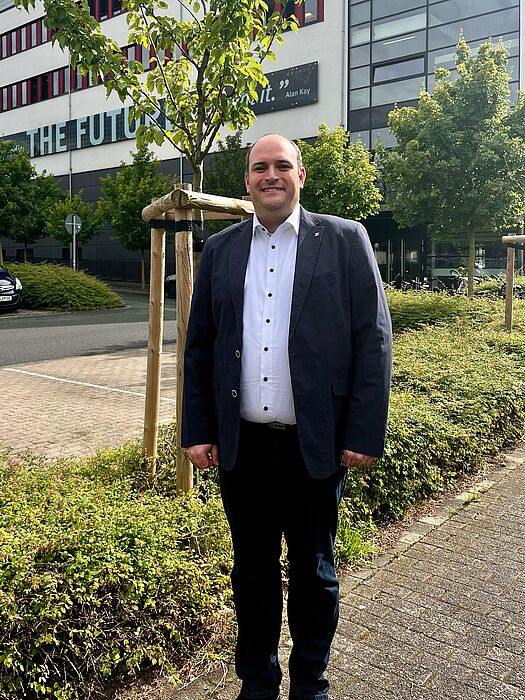Dr Martin Dräxler, currently Head of Cross-Divisional Digitalisation at Weidmüller Interface in Detmold, has had a remarkable academic and professional career. Even as a child, he developed a passion for computer science that has stayed with him ever since. His path led him to Paderborn, a city that was far enough away from home for him to become independent, but close enough for him to keep his connection to home. The University of Paderborn offered him ideal conditions for his academic development and became a second home for him for almost ten years.
The academic career
With a less than outstanding Abitur in his pocket, Martin was looking forward to finally being able to do what he was really passionate about after leaving school. His bachelor's degree in computer science was just the beginning; he continued his studies through to a master's degree and finally a doctorate. During this time, he was particularly influenced by the various EU projects he took part in, which enabled him to travel the world and get to know new cultures. These projects also gave him the opportunity to write follow-up applications and support subsequent generations.
A first important piece of advice from Martin to students is to find out during your studies what you really want to do, what you enjoy and what you envision for your future. This time offers the perfect opportunity to explore different areas in the form of minor subjects, specialisations and project groups, and to immerse yourself in what you enjoy. At the same time, he also emphasises the importance of consistency.
Unfortunately, there was only limited consistency in the curriculum when he was a student, as it was characterised by numerous changes to the examination regulations. Martin was one of the first to graduate with a Bachelor's and Master's degree rather than a Diplom. However, these changes brought both challenges and advantages. Parallel to his studies, he worked early on as an assistant in computer operations at the Heinz Nixdorf Institute (HNI) and later in a research group, where various project partners gave him his first insights into industry, although he initially aspired to an academic career.
A doctorate was a long-cherished goal for him. An internship at CERN in Switzerland encouraged him in this endeavour and he stayed at Paderborn University for his doctoral thesis, which he can warmly recommend. The international collaboration during this time and the exchange with people from different countries enriched his experience considerably and prepared him well for his work in an international company.
From project manager to digitalisation expert: success story at Weidmüller
After several research projects and conference submissions, Martin decided against his original plans in favour of a career in industry. A summer school enabled him to get to know various companies and universities in the region within 3 days, including Weidmüller, where he works today.
The application process was relatively normal for him, as it is for many others: he applied for advertised positions as well as on his own initiative. However, sometimes the atmosphere at the interviews was not right, which is why he also turned down offers and listened to his gut feeling. Today, having sat on the other side of the table more often, he advises students to clearly present their skills and experience in applications, but also to be honest about what they particularly enjoy. He also emphasises how important it is to describe internships, SHK jobs and experience in research and project groups, even without a lot of professional experience.
His professional career at Weidmüller began as a project manager in product life cycle management. Under his leadership, the PLM system was successfully introduced worldwide. Over time, he took on more and more responsibility and management tasks in his team. Today, he heads the Cross-Divisional Digitalisation department, which serves as a cross-divisional contact for all divisions.
Martin describes his day-to-day work as varied, characterised by new trends and challenges such as artificial intelligence and home office regulations. He finds working in traditional companies that have to find ways of dealing with digitalisation particularly exciting. These tasks are demanding, but also offer many opportunities to help shape the future.
In his career, he is particularly proud of the introduction of the PLM system. He also greatly appreciates the small successes following challenges. When setbacks occur, he seeks dialogue with colleagues to find solutions. He sees taking on management tasks and the associated challenges as a significant milestone.
3 tips for students:
In conclusion, Martin gives three important tips to students: Firstly, to find out what you are good at and enjoy doing, and to pursue this consistently. Secondly, to pursue the goals you set yourself with determination, but also to question them from time to time. Thirdly, to get to know the world and understand how it works - an opportunity that presents itself particularly during the study period.
Paderborn University was home for Martin for almost ten years. He looks back fondly on this time and urges students to be courageous and do what they love. After all, the future is uncertain and it is important to seize the opportunities that present themselves.

